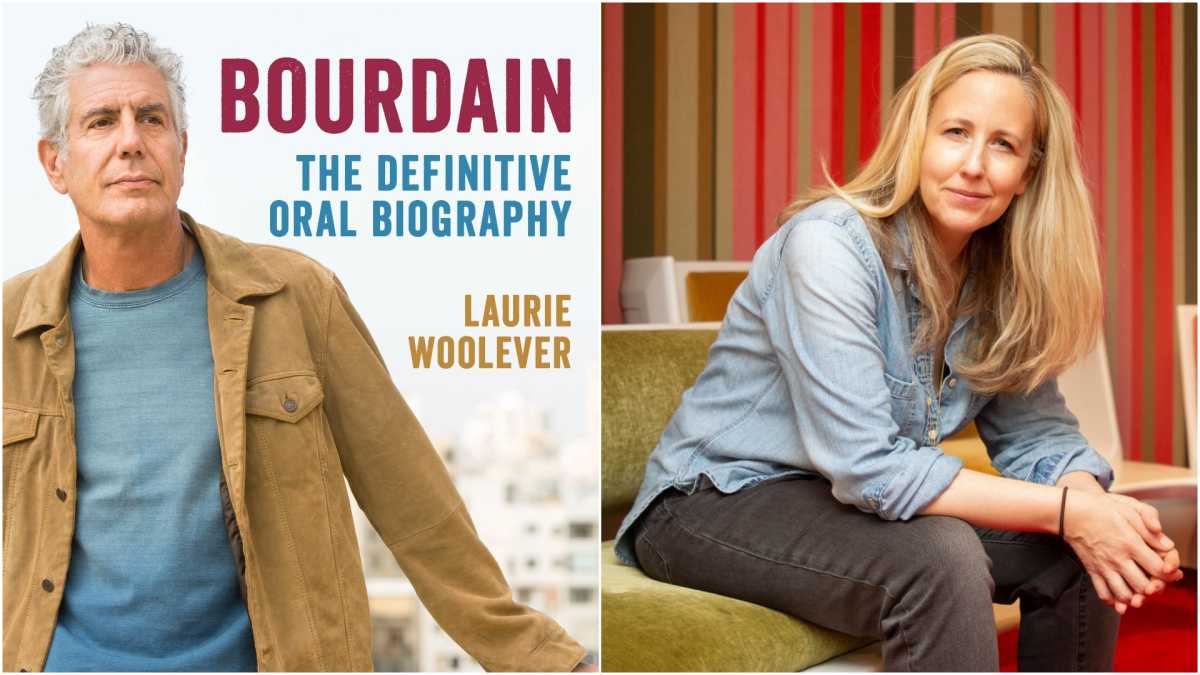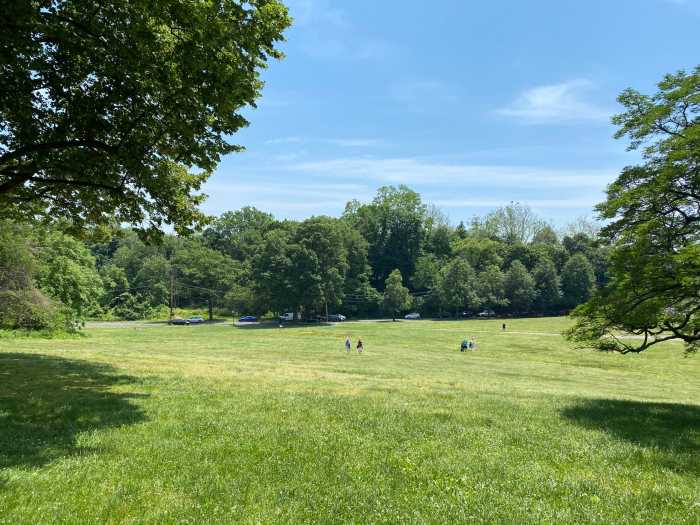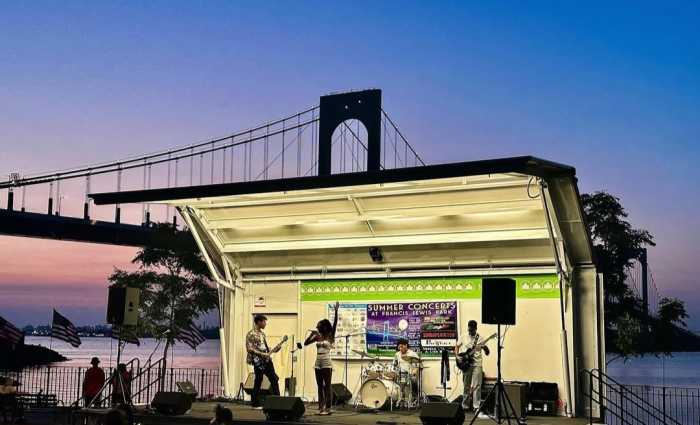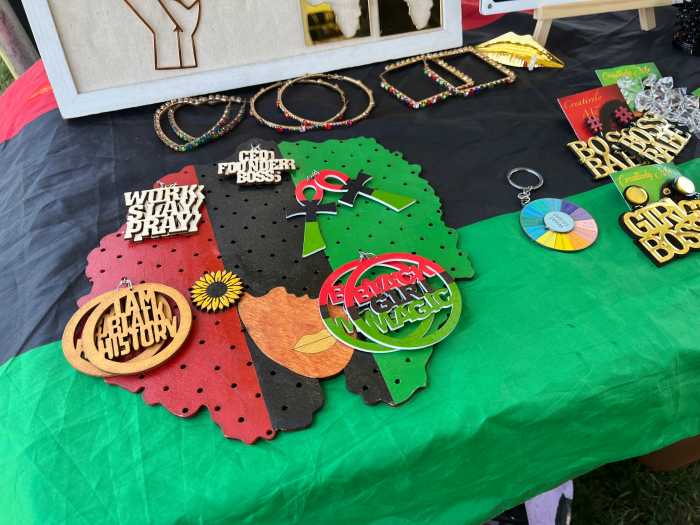The news of global gastro adventurer and celebrity chef Anthony Bourdain’s unexpected death in 2018 sent shockwaves across the nation.
Bourdain was found in his hotel room in France, where he was filming an episode of the award-winning CNN series “Parts Unknown.” Fans worldwide adored the uber-popular TV host. He was remembered by family members, friends and colleagues as a remarkable and talented person, and a doting dad to his daughter Ariane.
Bourdain’s legacy has only grown since his tragic death.
In the introduction to her intriguing new book, “Bourdain: The Definitive Oral Biography,” Jackson Heights-based author Laurie Woolever gives readers a behind-the-scenes deep dive into the complicated and amazing life of an enigmatic man.
“Through my work as his assistant and occasional co-author, I thought I’d already gotten to know Tony quite well,” Woolever writes. “I knew where he was nearly every minute of every day, whom he was with, what he was planning to do, and why. I was steeped in his work, deeply familiar with his voice and all the beats of his highly public origin story. However, in talking with the people who knew him in his youth, as a wayward college student, fledgling cook, dedicated beach bum, thrill-seeking drug addict, journeyman chef, ambitious young writer, semi-reluctant television star, steadfast spouse and father, supportive friend, and collaborator, I came to realize that I’d really known only a fraction of who Tony was.”
Woolever said she wanted to give the people who knew him best “a chance to tell their stories about Tony to someone they trust, so that they, and the public, could try to make sense of his death, and the beautiful life he led.”
In the words of friends, colleagues and family members, including his brother Christopher Bourdain and his late mother, readers will discover the many sides of Bourdain — from his childhood and teenage days, to his early years in New York and through the creation of his game-changing memoir “Kitchen Confidential” in which he wrote, “An ounce of sauce covers a multitude of sins,” to his rise as an author and TV personality.
“In the book, a number of chef colleagues share their recollections of Tony’s struggles with heroin and cocaine in the 1980s, which led him to be an unreliable and at times, unemployable cook,” Woolever said. “He was a romantic, and at times could be laid low by disappointments in his love life and travels.”
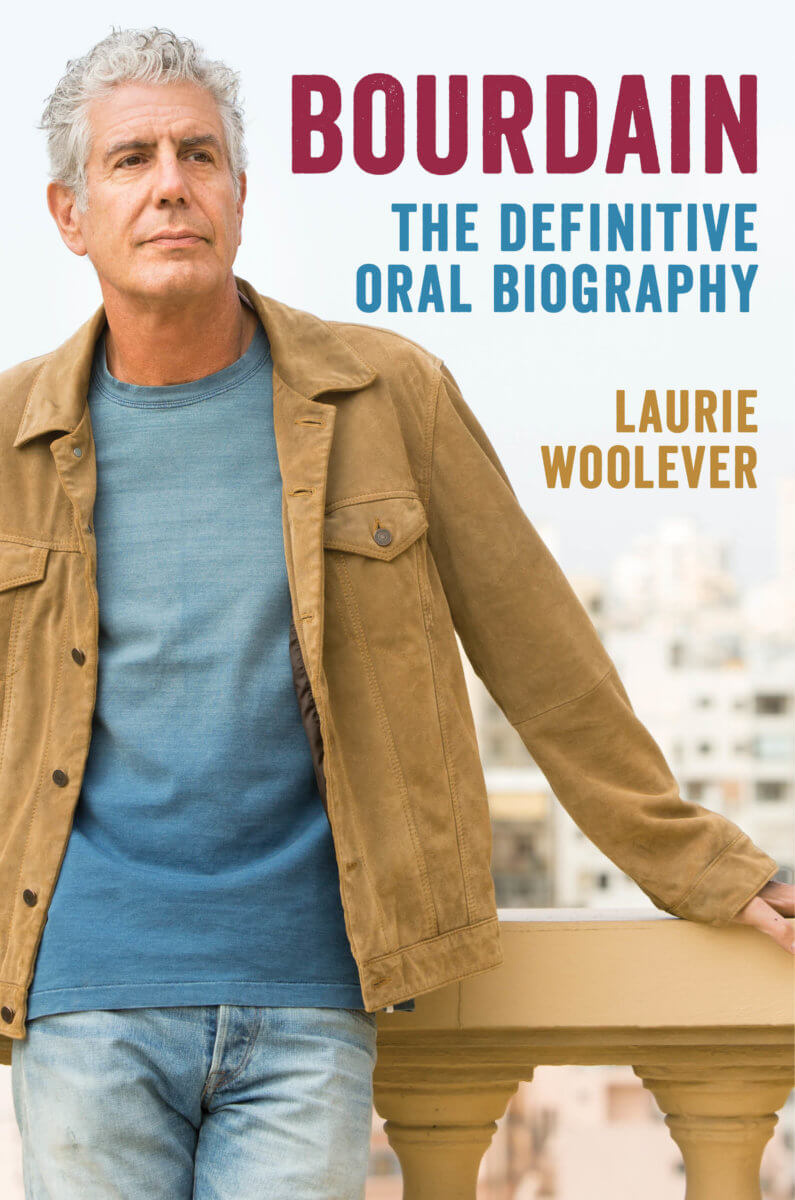
Woolever worked as a cook early on and had been writing about food and travel for various publications like the New York Times and Food and Wine since 1999. When she met Bourdain back in 2002, he quickly hired her to help him with a cookbook he’d been working on, after “Kitchen Confidential” unexpectedly jumpstarted his success.
She ultimately co-authored “Appetites: A Cookbook,” with him, and later carried out his last book project, “World Travel: An Irreverent Guide,” which landed the number one slot on The New York Times bestseller list this year.
It was a match made in culinary heaven.
As his assistant for nearly a decade, the Queens foodie had accompanied the wandering chef on one shoot per year, since 2014, when he was filming exciting “Parts Unknown” episodes in foreign lands. Highlights from their exotic trips included attending a bullfight in Okinawa, Japan, exploring Kanazawa and Tokyo, Japan, and spending hours on motorbikes in Hue, Vietnam – although they were “just scratching the surface of the food scenes in those cities,” Woolever recalled during a 2017 interview with QNS.
The “Parts Unknown” episode featuring the “World’s Borough” aired in May 2017, as Bourdain, a New York City native and longtime Manhattanite, traveled through Queens, sampling ethnic fare at several local eateries — no passport required.
On camera, he described Queens as “a stewpot of neighborhoods filled with the languages, cultures, traditions and flavors of many lands,” and “an international crossroads.” He also acknowledged how hard the immigrants, who make up the backbone of the culinary scene, have worked to make it in New York City.
On the corner of Warren Street and Roosevelt Avenue, Bourdain discovered “Little Ecuador,” and couldn’t resist the morcilla (blood sausage) with potato cakes and the succulent, crisp-skinned roast pig (known as hornado Ecuatoriano) served up fresh and hot from a street food vendor.
His next stop was supper at Yu Garden Dumpling House in Flushing, where he chowed down on cold beef tripe, lion’s meatballs made with pork and ginger, and ground pork soup dumplings. Other featured spots included Neir’s Tavern in Woodhaven.
The final lap of Bourdain’s gastro journey brought the culinary warrior to Aqueduct Racetrack in South Ozone Park, where he met up with Woolever.
“The Queens episode gave viewers a taste of the rich culinary, political and cultural landscape of the borough,” Woolever said. “There are so many cuisines represented in the restaurants, grocery stores and vendors throughout the borough, with the vast majority at a very reasonable price point. There’s enough fine dining, especially in Long Island City and Astoria, to satisfy that demand, and our street food is the best in the city.”
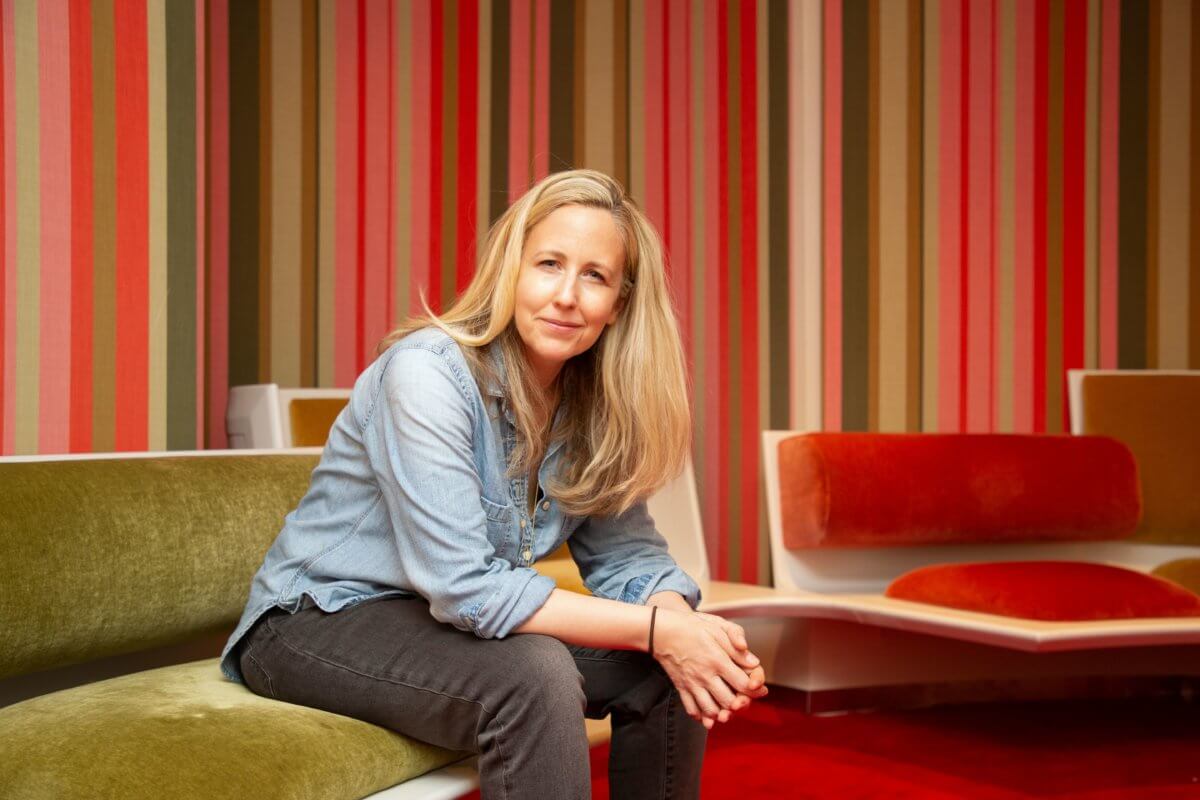
Unparalleled in scope and deeply intimate in its execution, with a treasure trove of photographs, many of which have never before been seen, “Bourdain: The Definitive Oral Biography” is a testament to the life of the remarkable man, in the words of those who shared his world.
“Tony was a complicated person. He was both the person you saw on TV and on the written page — brash, funny, intellectual, profane, sarcastic — and, also, a much quieter, introspective and shy person; at times, socially awkward,” Woolever recalled.
Woolever said the conflict he felt about being an on-screen personality made his persona “compelling and believable.”
“He was quick to call himself a competent chef, but not a highly creative or skilled one. He frequently pointed out that he was nowhere near the level of some of his famous chef peers and friends, like Eric Ripert, José Andrés and Daniel Boulud. He was a writer at heart, having been working at the craft for much of his adult life before publishing ‘Kitchen Confidential’ in 2000, a turning point in his career,” Woolever said. “He wrote very clean prose that was packed with wit, literary references, and the truth as he saw it. And, he was a devoted parent.”
Recounting a humorous moment, Woolever added that Bourdain was fascinated by, and had a great respect for, medical science.
“It’s not exactly funny, but it struck me as funny at the time, because it was so out of character. Tony urged me, after getting shingles, to make sure I got a shingles vaccine. He famously said that one’s body isn’t a temple, it’s an amusement park, so it struck me then that he would give practical medical advice,” Woolever said. “But on reflection, he was always up on his vaccines, because he traveled so much, and often had to get extra shots for overseas travel.”
Woolever believes if Bourdain were still alive, he’d still be entertaining.
“I think Tony would still be making television, in some way, perhaps, behind the camera instead of in front of it. He’d still be writing about his experiences, adventures and opinions,” she said. “He’d be spending time with his family. And I think he would be advocating, as he always did, for cooks and other restaurant workers, who have been hit hard by the ongoing pandemic.”
In “Bourdain: The Definitive Oral Biography,” many people who knew him try to remember him both and and off camera.
In the book, colleague Morgan Fallon (director-cinematographer for Zero Point Zero Production), recalled an episode filmed in West Virginia, where Bourdain spoke with several coal miners. He told Woolever: “That was the best of him, where he was able to strip down all the celebrity bullshit and connect with a group of people in a really open-hearted, embracing, fearless and empathetic way.”
Chef-restaurateur, frequent TV and publishing collaborator Dave Chang told the author: “The things that Tony used to love were disappearing [toward the end], and he couldn’t fill that heroin void anymore, and then a relationship came in at the right place, at just the right time for him. Something new, and dangerous, and foreign — all the same things that travel presented to him. It was inaccessible; the same thing that fine dining had been to him.”
Robin Standefer (production designer, Roman and Williams), offered: “It wasn’t a surprise to me that he connected with someone [Italian actress/director Asia Argento] erotically, that he could not disconnect from the intensity of that. When he talked, I still recognized it as him, but he was embracing another part of him. He was looking for something to give him that high again.”
Many wonder what may have led to Bourdain’s tragic death, and that is the main focus of the last quarter of the book.
“There are so many things that get a person to that place of making the terrible decision to end one’s life. It’s never just one incident or disappointment,” Woolever said. “He was a fundamentally lonely person, a seeker, always on the move, always looking for the thing that was going to make him feel whole.”
Asia Argento was grief-stricken when she spoke out for the first time in a DailyMailTV interview from Rome in September 2018, three months after her lover died by suicide. “People say I murdered him. They say I killed him,” she said tearfully, revealing that she was cheating on him, after photos surfaced showing her with another man, three days before Bourdain’s death. “But I understand that the world needs to find a reason. I would like to find a reason, too. I don’t have it. I understand that people wanted to blame me because he was so deeply loved and he entered in the hearts of so many people, into their lives, into their hearts.”

